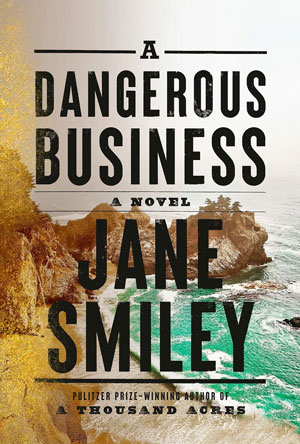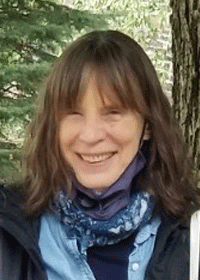Fulbright Chronicles, Volume 2, Number 4 (2024)
Author
Katherine Arnoldi

A Dangerous Business by Jane Smiley who was a Fulbright Fellow to Iceland in 1976-77.
When we set off on our Fulbright adventures equipped with a proposal and itinerary, we are told that what we will encounter on the ground may change not only our plans for research but also, ultimately, ourselves. I first heard this at an orientation in Washington, D. C. for Fulbright Fellows going to South America. Okay, I thought, I can understand how my experience in-country may be nothing like what I imagined, but my life? How on earth could my entire life change?
This is precisely what happened to Pulitzer-prize winning author Jane Smiley. According to “Iceland Made Me” in Fulbright Chronicles, Vol. 1, Smiley embarked on her 1976-7 Fulbright Fellowship to Iceland as a scholar of the Icelandic Sagas, but left as a writer. During the dark days of the Icelandic winter, she began writing a novel based on her grandparents’ desire to start a ranch in Idaho that was “an Icelandic tinged combination of wind and sky and snow and grass, making the best of isolation and hard work, tragedy, luck and magic” (14).
Our sex worker narrator’s life will change again and again while trying to make the best of one bad situation after another.
Except for the snow, this could be a good description of A Dangerous Business, in which our sex worker narrator Eliza Ripple’s life will change again and again while trying to make the best of one bad situation after another. She grows up in Kalamazoo, Michigan, with parents who are Covenanters, “chosen,” according to Eliza, to “never enjoy a single worldly thing” (41). Her scowling mother administers whippings followed by prayer sessions, detailing her sins, until Eliza feels irrevocably “damned” (67). At eighteen, she falls in love with the tall and handsome Liam Callaghan, whom her parents see as not only without prospects, but also soulless, so they pawn her off instead to an older man, Peter Cargill, who takes her to Monterey, California, in the 1850’s to seek his fortune.
Peter Cargill turns out to be even worse than her parents, beating her, making her his servant, and violently “putting it to her” twice a day, indicating that Eliza does not yet have the word for rape. When she gets pregnant, he takes her to a doctor who gives her a concoction, an abortifacient, and then to another doctor who gives her a diaphragm to prevent further pregnancies. While grateful for that, Eliza is not sorry when this brute of a husband is killed in a bar room brawl, except that she is then left adrift and penniless.
Enter Mrs. Parks who offers Eliza employment at her brothel where Eliza finds that men “do their business”—indicating that Eliza has still not yet found the language for this sex, either. Eliza concludes that the clients treat her better than her husband, but, Mrs. Parks, who has clearly been around the block and even employs a bodyguard to remove the violent or rowdy clients, reminds her that just “being a woman is a dangerous business and don’t let anyone tell you otherwise” (61).
A dangerous business, indeed, because soon young women who work in the brothels are disappearing, and mutilated bodies are turning up in rivers or wrapped around trees and, since no one seems to care, Eliza and her friend Jean, who works at a brothel for women and likes to dress as a man, take it upon themselves to find out who the murderer or murderers may be. Every one of Eliza’s clients is a suspect as we meet them one by one.
While Eliza arrives in Monterey emotionally shut down, her experience in this new country, little by little, opens her up. She is overcome with the smell of pines, or the brilliant light on the tops of the trees, or by Monterey oaks with their long and gnarly limbs, or by hawks, pelicans, and a condor’s dark shadow as it flies overhead. She learns to be as aware as the once-wild mustang she rides in the mountains while she and Jean look for clues and evidence.
A book is a journey to another world and this one is, too, as the story surprisingly twists and turns, just like the roads down to Monterey Bay. Some of the swerves in plot raise moral dilemmas not so easily dismissed, but our narrator and her friend end up with lives changed in ways we could never have guessed. What Eliza and Jean find involves the importance of the heart finding its own true home.
This is precisely what happens to us on our Fulbright experiences, as we are transformed and expanded by a heightened awareness, not only by all we are experiencing on the ground but also by our increased knowledge of ourselves. We, perhaps for the first time, are able to see how trapped our awareness is by our culture, and we examine our preconceived perceptions to see the possibility of breaking free. Then, like Eliza and Jean, we can also find our own road, our own true home.
Smiley, Jane. A Dangerous Business. New York: Knopf. 2022. 208 pages. $28.00.
Biography

Katherine Arnoldi, Ph.D., creative writing Fulbright Fellow to Paraguay (2008-9), received two New York Foundation for the Arts Awards (Fiction/Drawing), the De Jur Award, and the TransAtlantic Fiction Award. She’s the author of the graphic novel, The Amazing True Story of a Teenage Single Mom (Hyperion, 1998), nominated for a Will Eisner, won two American Library Association awards and was named a Top Ten Book of the Year by Entertainment Weekly, as well as All Things Are Labor, Stories, (U. Mass Press, 2007), which was a Juniper Prize winner. She is currently a lecturer at Mercy College, New York, teaching fiction and poetry. She can be contacted at Karnoldi2100@gmail.com
